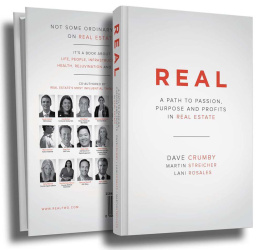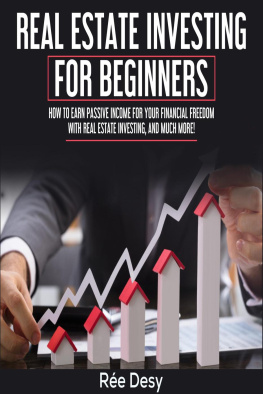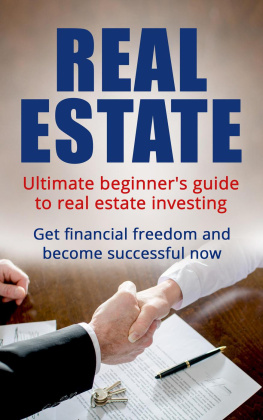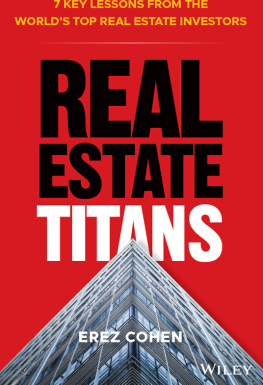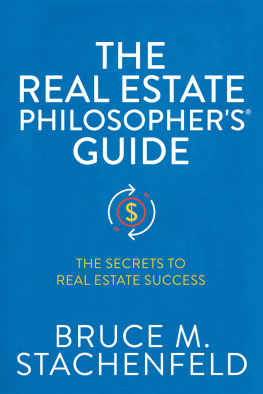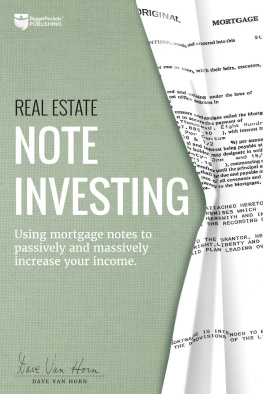Table of Contents
real
a path to passion, purpose, and profits in real estate
Copyright 2013 By Realvolve, LLC.
All rights reserved.
Title ID: 4331720
For my parents
Who taught a little hellion that falling down is ok as long as you get back up.
And for my wife, Lisa, and daughters Taylor, Amber, Kaydee, and Jessica, who have learned through all of lifes ups and downs right beside me
World change starts with educated and healthy children. We support programs that expand literacy, gender equality and science research.
20% of royalties are donated to RoomtoRead.org and the Wylder Nation Foundation.
INTRODUCTION
Dedication to Craft
FOREWORD
Michele Serro
Founder, Doorsteps
Like so many hardworking folks, I began my career dreaming of having some kind of meaningful impact on the worldbuilding something interesting, something important, something needed, something that would begin as mine, quickly become ours, and with luck would one day become everyones.
My connection with real estate began in 2006 when I bought my first home in New York City. Suffice it to say, the buying process was painful and jarring, and I could not understand why on earth it needed to be that way. If the experience of making a home for yourself and your family is so important and so profoundly human, it only follows logic that the experience of buying one should be, too. I remember saying to myself, if Jeff Bezos can make buying a book a delightful experience, why not do the same with a home? Although I was right to want a better experience, I was incredibly naive about the true complexities of effectuating a real estate transaction.
But like so many things in our lives, when there is something you need to learn, the same situation will repeat itself until you grasp the lesson or accomplish your goal. In 2010, I went through the buying process a second time, and it was just as bad, if not worse, than the first go. At the time I was working at IDEO, a leading design firm, and my experiences there led me to understand why the real estate process was so bad. Most systems tend towards the complex and fragmented, with multiple stakeholders and misaligned incentives. Real estate is a system. Add to that the fact that buying a house is one of the most emotional purchases in a lifetimeclearly, there is nothing one-click about it.
My time at IDEO taught me to take a critical look at accepted models and seek opportunities to make them better. And I thought homebuying could be better. Like any good designer, in order to effect meaningful change, I had to first gain true empathy for the people, the system, and the players I was looking to help. So, I quit my job at the worlds most respected design consultancy and went on a quest to learn and respect real estate and all of its little quips and quirks.
After months of research and conversations, it was clear that the real estate agent, one of the most important actors in buying a home, was at a constant disadvantage. When transactions go smoothly, an agents value is easily overlooked. However, when things go wrong, the agent is the first to be blamed, despite significant investment of time and effort. Because of where they sit within an incredibly complex system, the impact of an agents work is literally obscured. So it was not surprising to me to see so many agents become a product of their environment, getting too wrapped up in the transactional side of things, chasing the next sale instead of building long-term relationships, because, well, a sale translates to survival.
In taking on the home-buying process and with this in mind, I knew it would be vital to reframe the industrys notion of service to create a better environment for agents. Moreover, such a shift would increase expectations on the part of the consumer, providing clarity about the experience and the ability to ask for service. I believed a different mindset could begin to change the industry.
I connected to so many of the thoughts and stories in this book, but most significantly to the idea that real estate is not just a job, but a craftyour craft. Why think about real estate as a craft? A craft is honed over a lifetime; even a master craftsman has skills to refine and new knowledge to acquire. Within a craft system, there is always room to improve and to derive personal satisfaction from the process and end result.
So, what exactly, is the true craft of real estate? Dave, Lani, Martin, and all of the contributors to this book have touched on many of the things that shape the craft of real estate. Distilled to their simplest, most vital components, they are skill , knowledge , and passion .
Whether learned through study or developed through experience, skill justifies the need for increased specialization. This precept is not about training to do a job with your eyes closed, it is about honing a craft in order to make a difference and build something meaningful. Mastery results from constant repetition.
Knowledge is both theoretical and practical, with the latter being most relevant to craft. Applied knowledge enables one to be discerning and particular in their actions, responding to the situation at hand with relevance and value.
Passion is the love of or investment in an art that motivates us to keep practicing and honing our skill. Passion draws us to like-minded people and livelihoods. It creates pride in our work. We find meaning by finding our passion.
Some will wonder where technology is on this short list. Technology can enhance good craftspeople, but it cannot replace them.
Real estate will always require the contribution of smart, invested people motivated by a sense of purpose. Focus on your purpose and your passion. Let passion be the first thing that makes you a good agent. Yell about your love of the craft from the rooftops, let your zeal shine in your emails, recognize your dedication in your conversations when you become everyones favorite agent. Because actual passionmessy, unapologetic passionis something undeniable that no one (most importantly, you) can diminish or dispute. Helping people find their way home is important, rewarding, and life-changing work.
Start Here
It is every mans obligation to put back into the world
at least the equivalent of what he takes out of it.
Albert Einstein
Its a sizzling Phoenix, Arizona afternoon in August, 2006. My wife and children are splashing in the pool while I man the grill. Im ensconced in a shady spot, keeping watch over the burgers and dogs, and while the shade provides some respite, the daytime temperature remains 112. Describing an Arizona summer as hot is a gross understatementthe breeze on your face feels like sticking your head in a convection oven.
Who wants cheese?, I yell out.
Making a cheeseburger in the summertime in Phoenix requires a bit of planning. The final assembly must be expertly timed. You cant keep the cheese outside on standby or it will melt and stick to whatever surface it is on. Instead, the burgers have to be very nearly ready so you can sprint to the fridge, grab the Cheddar Jack, rush back, top the patties, and achieve a nice melt before lunch is incinerated.
Armed with a beer in one hand and a spatula in the other, Fleetwood Mac on the speakers, and the blissful sound of my children playing, I seemingly dont have a care in the worldexcept for the cheeseburgers. Indeed, my real estate business is booming. That particular month marked my tenth year in real estate and the third consecutive month of record personal income. I had grossed just over $80,000 in commissions the month prior and nearly $50,000 in revenue the month before that. I have roughly 25 active listings, with four in escrow, and stand to earn $40,000 from those sales alone. It seems unreal that, a scant eight years ago, I had to call my wife and tell her we were broke because multiple closings had disintegrated, thus vaporizing my earnings.

